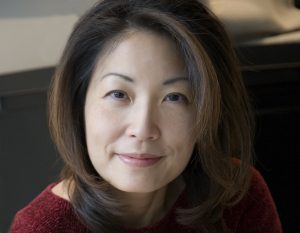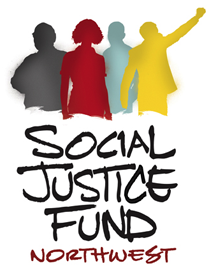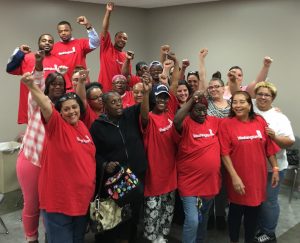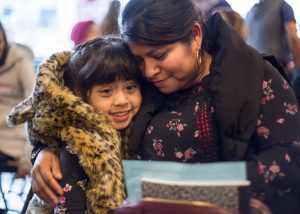

It was an honor to serve as this year’s Diversity Partner Grant Co-Chairs and as always, it gave us the opportunity to meet and get to know so many more of our WA Women Foundation members, which in turn provides me with connections that will last for many years to come.
This year, the process for choosing the topic of criminal justice was timely and carefully planned.
Before the Grant
Our leadership team, led by President Beth McCaw, Grant Programs Manager Laura Ciotti and WA Women’s Foundation member Maura Fallon, put together a year-long program that culminated with the work of this committee. Earlier this year, all WA Women’s Foundation members were invited to read Brian Stevenson’s book Just Mercy followed by a discussion at The Seattle Public Library. Read more about the discussion here
Members were then invited to watch the final episode of the PBS series Race: The Power of an Illusion (2003). The episode called “The House We Live In” focuses on the ways institutions and policies advantage some groups at the expense of others.
The words “mass incarceration,” “Prison Industrial Complex” and the “School to Prison Pipeline” are now familiar terms to many of us. We at the Foundation wanted to become better informed about these social justice issues and take action toward addressing these issues.
As a result, this fall’s Diversity Partner Grant committee focused on Criminal Justice, and it had the highest number of members (24) participate out of all of our previous Partner Grant committees since the initiative began in 2011. Through fundraising and members’ participation, we collected $15,000 to award to one organization.
Our Process
Before the committee embarked on its work, we held a workshop called “Healing from Racism to Build Stronger Philanthropy” led by WA Women’s Foundation member, Maura Fallon. We felt that in order to have a better understanding of the issues we would be studying, we needed to be 1) aware of our own racial identity and its impact, 2) understand how race and oppression have operated individually, and 3) develop goals for becoming an ally through philanthropy.
 At our first committee meeting, Mijo Lee, Executive Director of Social Justice Fund Northwest (SJF), shared their approach to grant making and educated us about issues within the criminal justice system, about the types of organizations that SJF funds, and why they support grassroots community organizing. It was an enlightening and humbling experience, and we are very grateful that Mijo took time out of her busy schedule this fall to share her expertise with us as our partner.
At our first committee meeting, Mijo Lee, Executive Director of Social Justice Fund Northwest (SJF), shared their approach to grant making and educated us about issues within the criminal justice system, about the types of organizations that SJF funds, and why they support grassroots community organizing. It was an enlightening and humbling experience, and we are very grateful that Mijo took time out of her busy schedule this fall to share her expertise with us as our partner.
Our committee members reviewed proposals from ten Washington-based organizations who, earlier this year, applied for funding directly from SJF. In this way, we were able to hear from some very small organizations who may not otherwise have learned about. After reviewing the proposals, committee members selected 3 organizations that received site visits. We then came together last Thursday, December 1 to talk about our visits and what we learned. We then voted and the grant award winner was determined.
Our Three Finalists

With its 44,000 members and a coalition of 2,500 small businesses, Washington CAN! is the largest community grassroots organization in Washington state. Since their founding in 1983, they have created and maintained a large, strong and diverse statewide community presence of grassroots leaders and community members working to achieve racial, gender, social and economic justice in Washington state and throughout the nation. They sought funding to support their work to reinstate the parole system in Washington which was eliminated in 1984, largely due to inadequate funding and now-disputed research that suggested rehabilitation-based sentencing fails. The funding would also support work to reform the system of Legal Financial Obligations, which are the extensive fines, fees, and costs imposed by the court on top of a criminal sentence. At our site visit, we met with extremely impassioned family members who are organizing and advocating on behalf of their imprisoned sons and brothers, and it was clear that Washington CAN!’s work in these areas gives much needed support for highly marginalized and impoverished communities under stress.

T.E.A.C.H., which is “Taking Education and Creating History”, is a higher education program in the Clallam Bay Corrections Center run by the Black Prisoners Caucus designed to bring college-level education to prisoners. T.E.A.C.H. classes are available to every prisoner regardless of ethnicity or religious beliefs. The program provides many opportunities for prisoners to develop a broad range of skills to improve their lives — leadership, teaching and mentorship, curriculum development, parenting, problem-solving, introspection, and a deep understanding of the forces and decisions that have influenced their lives. At our site visit, we met with ten founding members on the T.E.A.C.H. board. Their passion for learning and their enthusiasm to share knowledge has greatly impacted their lives and has radiated outward into the community. State law prohibiting the use of public funds to support higher education for incarcerated people has increased their need for additional support to build a vibrant and sustainable program. Their focus on education and self-empowerment for prisoners is unwavering, and their success has been truly measureable.
Both Washington CAN! and T.E.A.C.H. are exceptional organizations, and both deserve recognition for their incredible service to our communities.
Now it is our great pleasure to announce this year’s $15,000 grant recipient, Colectiva Legal del Pueblo.

Colectiva Legal del Pueblo (CLP) was founded in 2012 by undocumented community organizers, activists and immigration attorneys working to build community power to achieve dignity and migrant justice through advocacy, education and legal support. Their mission is to provide a wide variety of direct legal services as well as community organizing, community-based trainings and workshops. These programs empower immigrant and undocumented communities to know their rights, de-mystify the legal process and build collective power. CLP employs these strategies to strengthen communities to defend themselves from deportation and detention, and to increase movement building to address immigration reform and systemic racism within immigration laws and policies, both locally and nationally. Dedicated to the abolition of migrant imprisonment that profits off the separation of families and exploited labor, CLP envisions a world in which migrant justice work is rooted in the right of free movement for all people, regardless of borders.

A number of members from this Diversity Partner Grant Committee plan to stay in touch with each of the three finalist organizations. Many of us feel that a personal commitment, whether to volunteer our time or offer financial support, will help make a genuine difference in the lives of the people that these organizations serve. We invite you to join us and help to create transformational change in our community.
Through our groundbreaking model of women-powered, collective philanthropy, Washington Women’s Foundation has awarded $16 million in transformational grants that have enabled not-for-profit organizations to improve lives, protect the environment, advance health and education and increase access to the arts throughout Washington state.
All women are invited to join our strong and inclusive collective of informed women influencing community transformation. The challenges ahead of us are never as great as the power behind us. www.wawomensfdn.org
What an amazing grant process, so thoughtfully undertaken! Thanks to the committee leaders and to Laura Ciotti for helping the Foundation explore these complex, interwoven issues and identify some concrete steps to respond.